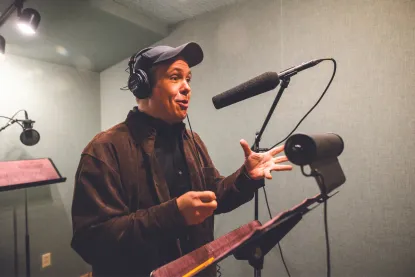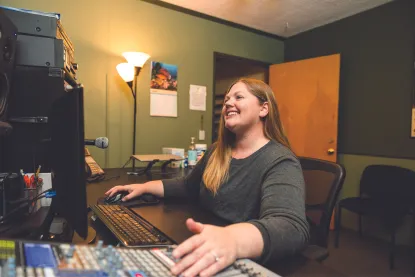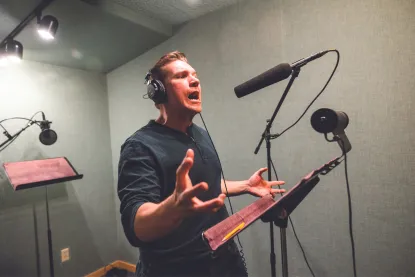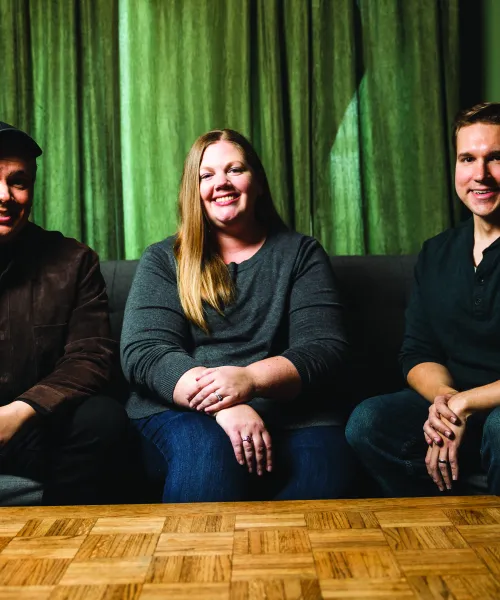By Rebecca Tavernini '11 MA
Imagine a character like Cookie Monster, Darth Vader or Marge Simpson. Right along with their iconic appearance, their distinctive voices likely come to mind, and make them memorable. When advertisers extol us to buy their products, or video game characters become lifelike friends, we are lured and assured by familiar, branded voices. And when those change—like Mario’s Italian brogue becoming Chris Pratt’s American bravado—we feel uneasy or even get upset. Voice is character; character is voice. Captions, too, must convey the timbre and tone of the speaker to paint an authentic audible picture.
Voice acting, just as stage or screen acting, is an art, and behind the scenes in Hollywood, three NMU alumni are artists in multiple modes. From anime to gaming, commercials to podcasts, streaming series to Crunchyroll, Kelly (Passinault) Moscinski ‘07 BS, ‘09 MA, Travis Moscinski ‘09 BS and Michael C. Pizzuto ’98 BA are some of the world’s leading voice actors and voice matchers.
Northern Magazine met the trio at The Voicecaster in Burbank—the very first voice casting house in the country, which the Moscinskis have owned for ten years. Since the studio started in 1975, it has worked on 50,000+ projects and provided 70,000+ voices for projects. Kelly runs the business, matching voice talent, such as husband Travis and friend Michael, with clients’ often very specific needs. She is also the recording engineer.
The Voicecaster offers five recording studios for clients as well as workshops in voiceover, demo production, auditioning, self-marketing and finding an agent. The main area of the studio is lined with large posters showcasing caricature drawings of stars from the mid-20th century—in categories such as Comedy, Suspense, Drama and Variety— that had been acquired by the original owner’s wife who worked at CBS. They provide perfect context for the variety of work still being conducted here today.
Stay tuned for more on that later, but first you must meet the faces and personalities behind a number of voices you will surely recognize…
Travis is the voice of Buzz the Bee for Honey Nut Cheerios. His cheery, caffeinated delivery counters the deadpan couple in the current commercials played by The Office characters Stanley and Phyllis at a kitchen breakfast table.



Travis is also in spots for Nescafe, California Avocados, Cisco Network and Panda Express. Previously he worked with AT&T, Discover, Verizon, Bacardi, Huggies, Fiat, LEGO and many more. In the popular video game Crisis Core: Final Fantasy IV, Reunion, he plays Kunsel.
Travis’ voiceover demo ranges from a sergeant-like trainer, Pure Michigan Zen, resort luxury, and video game whimsy to lunacy, sincerity and passion. A pretty wide range.
“I love to go to Disneyland and confuse people with my Mickey Mouse voice,” he joked.
Travis is also featured in-person in a dozen films including the heist movie Boden’s Mate and Something Wicked This Way Comes, plus performances in several short films and theatrical productions.
Pizzuto joined a touring theatre company and another in Cincinnati after graduating from NMU. “In 2007 I had the opportunity to go to Hong Kong for what was supposed to be a one-year adventure,” he recalled. “One year ended up being 13 years. That was where I got into the voice-over world. It started when I was in a show with a lot of different characters I played. The company I worked for did a lot for Disney Asia, and I started doing animation voice work full time. I did 60 different animation series over that time!” For some, that included more than 100 episodes. He voiced in English, and the shows were dubbed and subtitled when broadcast throughout Asia, as many residents preferred to watch that way in order to learn English.
Since returning to the U.S., and landing in L.A. nearly five years ago, he has had several on-camera roles from shows like HBO's McMillions to the music video of “Happier” by Marshmello featuring Bastille. His voice roles include the video games Lord of the Rings: Return to Carn Dum, Wasteland 3, Earth Defense Force 5 and Chivalry 2; and the animated series Masameer County, Romantic Killer, Bad Exorcist, Vinland Saga and Spriggan. (All currently streaming on Netflix.) As a SAG/AFTRA performer, he works as a freelance voice actor with multiple studios.
While they are both well-established voice actors, Michael and Travis say that traditional acting is still a valued part of their mix, and share an ambition to do more.
“There’s a lot more prep that happens with a stage show. I usually don’t get a script until the day of the recording,” said Pizzuto. “In this episode, for instance, you’re an evil old wizard, and you’re just learning it on the spot. Let’s try a voice and see if it works. It’s a lot of being able to think on your feet and making decisions quickly and efficiently.”
Travis added, “There’s definitely a physicality to it, or it sounds dead. And a cartoon character is usually bigger than life, so you need that extra energy.”
Kelly explained that “some clients think they want a celebrity, but with a lot of them, things are so subtle on camera. In a voice recording, you don’t have any body language or expressions you can show. And you don’t have to memorize lines, so celebrities will sometimes sound like they’re reading a script, because they are.”
To create audio personalities for the roles they read, the most important things Travis and Michael do is add to their bag of tricks by experimenting, and expanding their accent repertoire, from archaic Latin to Minnesota nice. But how do they consistently re-create a voice?
“It’s kind of like a muscle that you work out and it gets stronger. It gets better as you go on. Sometimes it just evolves. Take “Homer Simpson, which started with Tracey Ullman, which was totally different than it is now,” said Michael. “Sometimes I go back and find the old spots,” added Travis. “In doing Buzz, I have a special phrase that gets me into that voice. Then the directors might say, ‘More smile!’ and I give it more,” he says with a highly exaggerated physical smile.
Michael agreed: “I was the voice of Crystal Geyser, and I would say ‘Taste of USA’ [in a deep, radio voice] and that would just instantly get me into it.”
Versatility, they say, is what makes someone a great voice actor. You can’t just be a one-trick pony.
“There are a lot of different genres that call for a lot of different types. In the world of animation or games you have to be four or five different characters in one show, and sometimes they are talking to each other. The Simpsons again is a great example of that. Hundreds of characters are voiced by a few actors,” said Pizzuto.
“I feel all acting is a willingness to play,” Travis chimed.
“Our clients not only want talented actors, but ones who are reliable and will take direction,” said Kelly. “It doesn’t matter if someone is amazingly talented, but unreliable.”
Back to the Voicecaster, the process starts with a client request and a script, with a description of the imagined voice, including gender, age, ethnicity, vocal quality, attitude, tone and celebrity references or prototypes. “Then we reach out to agents as well as our own roster of talent,” Kelly explained. “They may record here, or from home studios [which burgeoned during Covid]. We usually have a 24- hour turnaround to listen to the auditions. We can tell in the first few seconds if they fit and followed directions.” Clients usually want to hear 5 to 30 audition finalists, but sometimes there may be 1,000 auditions – if the specs are wide. “It doesn’t matter what you look like, but what you sound like.”
At NMU, Kelly worked in the Forest Roberts Theatre box office and was student manager of the theatre when she started dating theatre major Travis. Michael was also a theatre major, but only because of the efforts of the late Theatre Director James Panowski. “Dr. P created a special theatre/business degree, which was just adding a 400-level business class that he taught, but it allowed me to get a scholarship, because I couldn’t afford to go otherwise. He also worked his Dr. P. magic, and next thing I knew I was working in the box office. He did this for so many other students, helping them and guiding them and putting them on the right track.”
Kelly had a similar experience in her master’s program in creative writing. Dr. P. created an independent study track, so she could get funding to continue her studies. “He said let’s talk to Ray Ventre, and between them they created a program for me.”
“NMU did something that other friends didn’t get. They push you into summer stock and pressure you to audition for professional theatre jobs, and have courses to prepare you for that, which lead to post-grad theatre jobs, like the ones I got,” said Michael.
“We are the lucky ones. There are a lot of people who want to go in to theatre, but take a different path. It’s not an easy gig, it’s not an easy life,” explained Kelly. “But I want to be encouraging: it can be done. It’s a lot of work. Northern has something special in terms of all of the opportunities you get. I did some on-stage, everything behind the scenes, I even got to direct a mainstage show. At other schools you get pigeonholed. The beauty of Northern is it can make you more well-rounded. It can get you where you didn’t know you needed to go.”
Did you ever wonder what Wildcat Willy would sound like if he could talk? Hear Michael’s and Travis’s renditions, and a little Kermit thrown in for good measure!
